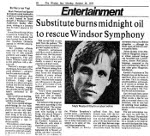Substitutes Burns Midnight Oil to Rescue Windsor Symphony

Mark Westcott had figured he'd spend a quiet weekend in California recuperating from a cold. Instead he found himself at Windsor's Cleary Auditorium Sunday afternoon, soloing in a concerto that he hadn't played in 2 1/2 years.
It was Edvard Grieg's Piano Concerto in A minor Op. 16, which Andre Laplante had been booked for as the Windsor Symphony Orchestra opened its 1979-80 subscription season.
But symphony officials were told Friday that Laplante was ill with stomach problems and couldn't keep the engagement. That sent Music Director Laszlo Gati to the telephone with a distress call.
Westcott's manager asked the Oregon-born pianist if he could substitute—and gave him five minutes to decide.
Westcott said yes, then burned the midnight oil in California Friday night, jumped on a plane and again worked into the wee hours in Windsor Saturday, wiping the cobwebs out of a piece he hadn't performed in 30 months.
They loved him at the Cleary Sunday afternoon. And well they should have.
This was no second stringer pinch-hitting for the main attraction; here was a young pianist who not only managed to reawaken that dormant Grieg in his mitts but had it jumping from the keyboard without a sign of droopy eyelids.
The audience, a near capacity one with all the seats sold but not all of them occupied, stormed its approval as early as the end of the first movement.
That moved Gati to comment from the podium: "We have two more movements to go, but I'm glad you like it."
Westcott's performance could have used an additional dash of color. But this presentation, over-all, was something indeed to applaud, and doubly so since it was prepared at such short notice.
The first movement cadenza had Westcott raising thunderclaps. The second movement found him dispensing droplets of poetry without drowning in a sea of sentiment. And the finale escaped any falling away in the quality of a performance of considerable persuasion and inspiration.
"You'd better remember the name, Mark Westcott," Gati had told us before. Who'd want to forget him after this?
The balance of the program went more according to the expected script. The orchestra, which had given Westcott nifty backing in the Grieg, also played Mozart's Symphony No. 29 K. 201—badly, I thought—and Zoltan Kodaly's Variations on the Peacock, with which it closed the concert in style.
You need to be able to spin highgrade silk in Mozart, of course, and that's a formidable task for an orchestra of the Windsor Symphony's current status—particularly in a work in which the colony of musicians is depleted since not as many instruments are needed as in some of Mozart's later symphonies. The Mozart on Sunday suffered from lint, loose threads, tears, with violins in particular needing to iron out their difficulties, in spite of the fact that Gati has now split them between stage right and left in an attempt to spread their sound. The third movement was cut to ribbons altogether—although the finale came off the bolt nearer a quality fabric.
Zoltan Kodaly is the 20th Century Hungarian composer whose national heritage was funneled into a conservative, almost 19th-century language, compared to the more contemporary idiom of that other great Hungarian, Bela Bartok.
Kodaly's Variations on The Peacock may not be the most significant piece of music in our time. Yet it is a sincere, colorful addition, with touches of almost an oriental flavor, and with moments that rival Stravinsky's The Firebird for deft orchestration.
Gati obviously feels a pride and passion for this material. What counts is that he was able to transmit them to his musicians, who in turn had me catching those qualities, thanks to their strong performance.
The next subscription concert won't be until Dec. 9, when Richard Householder conducts Handel's Messiah. It's a mistake to let main series activities lapse that long. You can bet Gati will be rectifying that next season.
By Harry van Vugt, The Windsor Star, October 29, 1979
Copied by Ben Serna-Grey
comments powered by Disqus